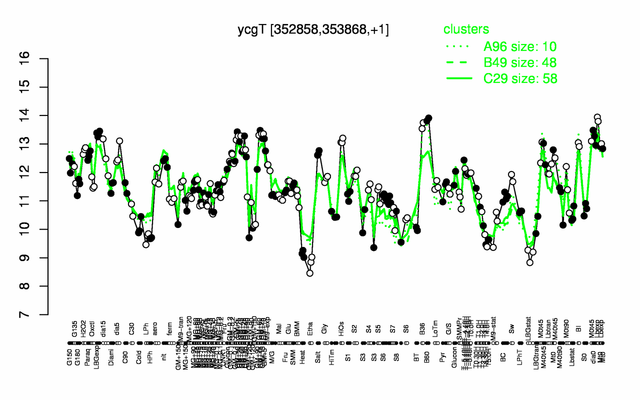YcgT
- Description: NADPH:ferredoxin oxidoreductase
| Gene name | ycgT |
| Synonyms | |
| Essential | no |
| Product | NADPH:ferredoxin oxidoreductase |
| Function | unknown |
| Gene expression levels in SubtiExpress: ycgT | |
| MW, pI | 36 kDa, 5.61 |
| Gene length, protein length | 1008 bp, 336 aa |
| Immediate neighbours | ycgS, nasF |
| Sequences | Protein DNA DNA_with_flanks |
Genetic context 
This image was kindly provided by SubtiList
| |
Expression at a glance PubMed
| |
Contents
Categories containing this gene/protein
This gene is a member of the following regulons
The gene
Basic information
- Locus tag: BSU03270
Phenotypes of a mutant
Database entries
- BsubCyc: BSU03270
- DBTBS entry: [1]
- SubtiList entry: [2]
Additional information
The protein
Basic information/ Evolution
- Catalyzed reaction/ biological activity: 2 reduced ferredoxin + NADP+ + H+ = 2 oxidized ferredoxin + NADPH (according to Swiss-Prot)
- Protein family: ferredoxin--NADP reductase type 2 family (according to Swiss-Prot)
- Paralogous protein(s): YumC
Extended information on the protein
- Kinetic information:
- Modification:
- Effectors of protein activity:
Database entries
- BsubCyc: BSU03270
- Structure:
- UniProt: O31475
- KEGG entry: [3]
- E.C. number:
Additional information
The gene is annotated in KEGG as an ortholog of thioredoxin reductase (NADPH) EC 1.8.1.9. In MetaCyc the protein is marked as “similar to thioredoxin reductase”. No EC annotation is available in Swiss-Prot. No literature/experimental evidence supporting the annotation is available. PubMed
Expression and regulation
- Operon: ycgT (according to DBTBS)
- Additional information: the mRNA is very stable (half-life > 15 min) PubMed
- number of protein molecules per cell (minimal medium with glucose and ammonium): 1152 PubMed
- number of protein molecules per cell (complex medium with amino acids, without glucose): 572 PubMed
- number of protein molecules per cell (minimal medium with glucose and ammonium, exponential phase): 617 PubMed
- number of protein molecules per cell (minimal medium with glucose and ammonium, early stationary phase after glucose exhaustion): 256 PubMed
- number of protein molecules per cell (minimal medium with glucose and ammonium, late stationary phase after glucose exhaustion): 84 PubMed
Biological materials
- Mutant:
- Expression vector:
- lacZ fusion:
- GFP fusion:
- two-hybrid system:
- Antibody:
Labs working on this gene/protein
Your additional remarks
References